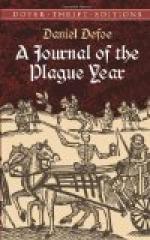But of this I shall speak again presently. I
return, in the mean time, to the article of infecting
one another at first. Before people came to right
notions of the infection and of infecting one another,
people were only shy of those that were really sick.
A man with a cap upon his head, or with cloths round
his neck (which was the case of those that had swellings
there),—such was indeed frightful; but when
we saw a gentleman dressed, with his band[286] on,
and his gloves in his hand, his hat upon his head,
and his hair combed,—of such we had not
the least apprehensions; and people conversed a great
while freely, especially with their neighbors and
such as they knew. But when the physicians assured
us that the danger was as well from the sound (that
is, the seemingly sound) as the sick, and that those
people that thought themselves entirely free were
oftentimes the most fatal; and that it came to be
generally understood that people were sensible of it,
and of the reason of it,—then, I say, they
began to be jealous of everybody; and a vast number
of people locked themselves up, so as not to come
abroad into any company at all, nor suffer any that
had been abroad in promiscuous company to come into
their houses, or near them (at least not so near them
as to be within the reach of their breath, or of any
smell from them); and when they were obliged to converse
at a distance with strangers, they would always have
preservatives in their mouths and about their clothes,
to repel and keep off the infection.
It must be acknowledged that when people began to
use these cautions they were less exposed to danger,
and the infection did not break into such houses so
furiously as it did into others before; and thousands
of families were preserved, speaking with due reserve
to the direction of Divine Providence, by that means.
But it was impossible to beat anything into the heads
of the poor. They went on with the usual impetuosity
of their tempers, full of outcries and lamentations
when taken, but madly careless of themselves, foolhardy,
and obstinate, while they were well. Where they
could get employment, they pushed into any kind of
business, the most dangerous and the most liable to
infection; and if they were spoken to, their answer
would be, “I must trust to God for that.
If I am taken, then I am provided for, and there is
an end of me;” and the like. Or thus, “Why,
what must I do? I cannot starve. I had as
good have the plague as perish for want. I have
no work: what could I do? I must do this,
or beg.” Suppose it was burying the dead,
or attending the sick, or watching infected houses,
which were all terrible hazards; but their tale was
generally the same. It is true, necessity was
a justifiable, warrantable plea, and nothing could
be better; but their way of talk was much the same
where the necessities were not the same. This
adventurous conduct of the poor was that which brought
the plague among them in a most furious manner; and




